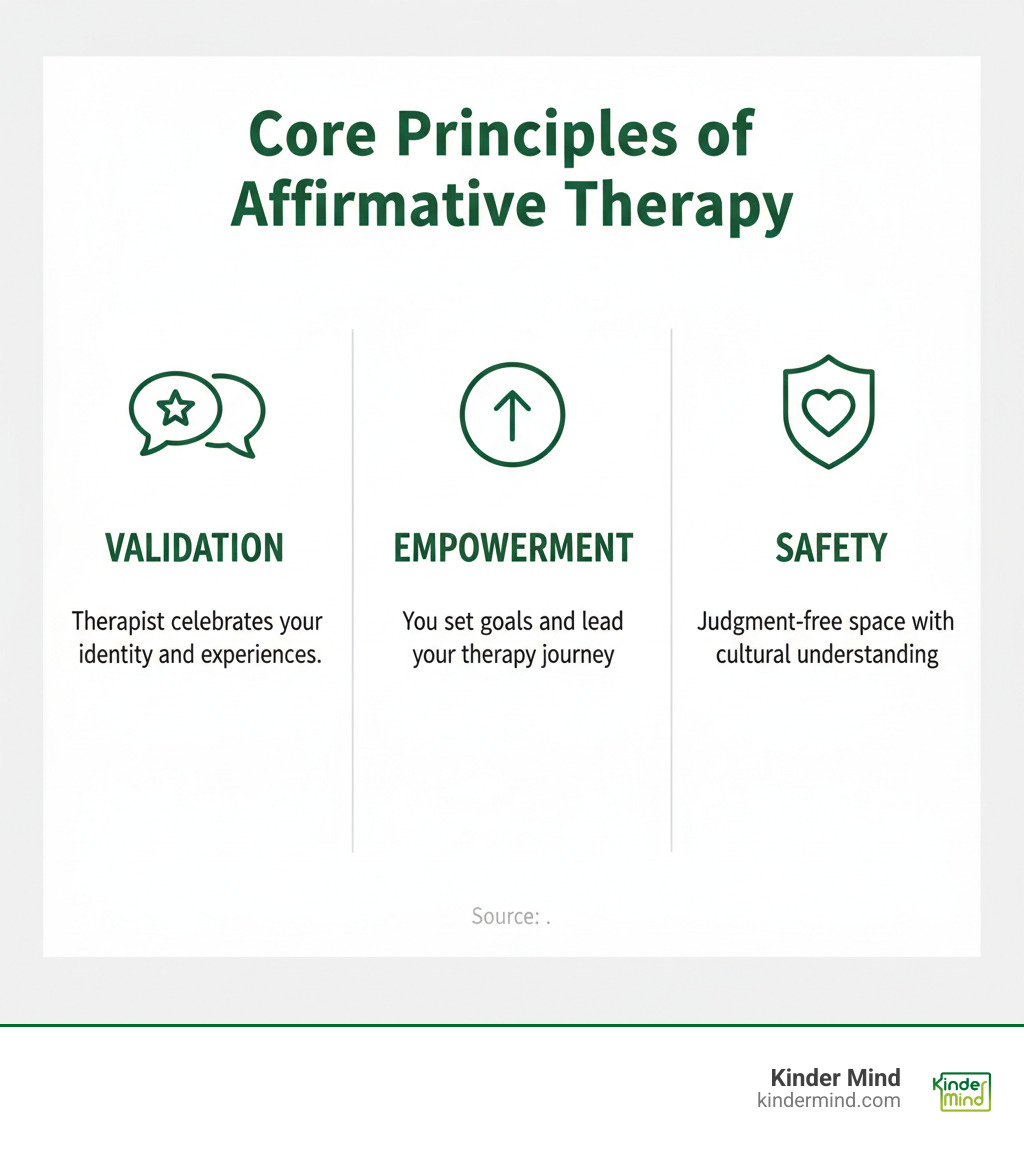Beyond Judgment Exploring the Benefits of Affirmative Therapy
Understanding Affirmative Therapy and Why It Matters

An affirmative therapist is a mental health professional who validates and advocates for clients' identities—particularly those who identify as LGBTQ+—rather than attempting to change or pathologize them. This approach creates a safe, non-judgmental space where your identity is celebrated, you are empowered to lead your own therapy, and your therapist understands the unique challenges faced by marginalized communities. For many, especially in the LGBTQ+ community, finding an affirmative therapist isn't just a preference; it's essential.
Research shows that LGBTQIA+ individuals experience mental health issues at rates 1.5 times higher than their heterosexual counterparts. This disparity isn't due to their identity, but to the discrimination, stigma, and minority stress they face.
Historically, traditional therapy has failed these communities. Homosexuality was classified as a mental disorder in the DSM until 1973, and "gender identity disorder" remained until 2013. These biases created significant barriers to quality care.
Affirmative therapy emerged as a response, representing a fundamental shift from viewing diverse identities as problems to recognizing them as natural variations of human experience. Today, it offers hope to LGBTQ+ individuals, their families, and anyone seeking a therapist who understands how societal expectations shape our lives.

What is Affirmative Therapy and Why Did It Emerge?
At its heart, affirmative therapy recognizes that all sexualities and gender identities are healthy, natural forms of human diversity. An affirmative therapist doesn't just tolerate your identity—they celebrate it as an essential part of who you are.
This approach is a hard-won shift. For decades, the institutions meant to help instead caused harm by labeling diverse identities as disorders.

The Shift from Pathologizing to Affirming
Until 1973, homosexuality was classified in the DSM as a mental disorder. Even after its removal, "Gender Identity Disorder" remained until 2013, when it was replaced with "Gender Dysphoria." This change refocused on the distress someone might feel, not the identity itself.
These classifications legitimized harmful practices like conversion therapy, which have been widely discredited and condemned by every major medical organization for causing trauma, shame, and increased suicide risk. An affirmative therapist stands in direct opposition to these practices, operating from the understanding that your identity isn't a problem to be solved. This shift was fought for through decades of activism, from the Stonewall Riots to policy changes like the repeal of "Don't Ask, Don't Tell."
Here's how different therapeutic approaches compare:
| Approach | View of LGBTQ+ Identity | Therapeutic Goal | Potential Impact |
|---|---|---|---|
| Pathologizing | A mental illness or disorder to be cured. | Change sexual orientation or gender identity. | Trauma, shame, depression, increased suicide risk. |
| Non-Affirming/Neutral | Not a disorder, but also not explicitly affirmed. | Address general mental health issues without specific focus on identity. | Client may feel unseen, invalidated, or judged. |
| Affirmative | A healthy, natural, and celebrated aspect of human diversity. | Support identity exploration, foster self-acceptance, address minority stress. | Empowerment, resilience, improved mental well-being. |
Core Principles and Practices
An affirmative therapist actively validates and celebrates your sexual orientation and gender identity. Empowerment and autonomy are central; you set the goals and lead the conversation in a collaborative partnership. They create a safe space through their language, body language, and even the office environment, such as by creating a supportive physical environment and ensuring gender-neutral bathrooms. Inclusive language is key—using your pronouns and asking open-ended questions like "Do you have a partner?" instead of making assumptions. Finally, affirmative therapists engage in ongoing self-reflection, examining their own biases and staying educated on LGBTQIA+ issues.
Key Definitions in Affirmative Counseling
- Gender identity: Your internal sense of being male, female, both, neither, or somewhere else on the gender spectrum.
- Gender expression: How you outwardly present your gender (e.g., through clothing, hairstyle, voice).
- Sexual orientation: Who you're attracted to physically, romantically, or emotionally.
- Cisgender: A person whose gender identity aligns with the sex they were assigned at birth.
- Gender dysphoria: The distress experienced when one's biological sex doesn't match their gender identity. The focus is on the discomfort, not the identity.
- Intersectionality: The recognition that we all hold multiple, overlapping identities (e.g., race, gender, sexuality) that create unique experiences of privilege and discrimination.
How Affirmative Therapy Addresses Minority Stress
Living in a world that assumes everyone is straight and cisgender creates a unique and persistent weight called minority stress. An affirmative therapist understands how to help clients manage this burden.

Minority stress is the chronic, high-level stress that comes from being part of a stigmatized group. It includes overt discrimination (e.g., job loss, harassment), prejudice, and subtle microaggressions (e.g., "You don't look gay."). Over time, this can lead to internalized oppression, where individuals absorb and believe negative societal messages about their identity.
Understanding Minority Stress Theory
Minority Stress Theory explains why LGBTQ+ individuals face higher rates of mental health challenges. The theory posits that these issues are not caused by identity, but by living in a society that treats that identity as less valid. These stressors—from individual bullying to systemic discrimination—are additive, piling on top of everyday life stress.
The impact is significant. Research shows 30-60% of queer-identifying people will experience anxiety or depression, 1.5 to 2.4 times the rate for cisgender, heterosexual individuals. Transgender people are six times more likely to have a mood disorder and attempt suicide. These numbers reflect the toll of constant stress, not personal weakness.
An affirmative therapist helps clients identify these external pressures and build coping mechanisms and resilience to thrive despite adversity.
The Therapist's Role in Healing
An affirmative therapist sees the full picture of your experience. Healing from minority stress involves several key steps:
- Validating experiences of bias: Your therapist will acknowledge that discrimination is real and your pain is a valid response to genuine harm. This validation alone can be profoundly healing.
- Challenging internalized negativity: They help you deconstruct harmful societal narratives and replace them with compassionate, accurate understandings of who you are.
- Fostering self-acceptance: In an affirming space, you can explore your identity without shame and build a relationship with yourself based on respect.
- Connecting with community: Therapists often connect clients with community resources like LGBTQ+ centers or support groups to counter isolation.
- Advocacy: They may advocate for you directly (e.g., writing letters for gender-affirming care) or help you develop your own self-advocacy skills.
Who Benefits from an Affirmative Therapist?
While affirmative therapy was created for LGBTQIA+ individuals, its principles of validation and empowerment benefit a wide range of people, including couples, families, and even cisgender heterosexual individuals.

Why an Affirmative Therapist is Crucial for LGBTQ+ Individuals
Research on mental health disparities shows that LGBTQIA+ individuals face higher rates of anxiety, depression, and substance use. The Trevor Project's 2024 survey found that 39% of LGBTQIA+ youth considered suicide. These disparities are not due to identity, but to minority stress, discrimination, and trauma. An affirmative therapist is trained to address these specific challenges, leading to better mental health outcomes.
They provide invaluable support for:
- Coming out: Processing complex emotions and preparing for others' reactions in a judgment-free zone.
- Healing from trauma: Addressing painful experiences of violence, discrimination, and stigma to develop healthy coping mechanisms.
- Substance use: Exploring underlying issues like trauma and minority stress within a framework that validates your identity.
Affirmative Therapy in Marriage and Family Settings
An affirmative therapist helps families steer a loved one's coming out by improving communication and building acceptance. For LGBTQIA+ couples, it removes the burden of educating a therapist, allowing them to focus on their relationship challenges. This understanding extends to diverse relationship structures. A polyamory-affirmative therapist supports those in consensually non-monogamous relationships without judgment, helping them build healthy communication patterns.
Benefits for Cisgender and Heterosexual Individuals
Affirmative therapy can also benefit people who don't identify as LGBTQ+. By questioning rigid societal expectations around gender and sexuality, you can uncover how these norms may have constrained your own life. This work can help you:
- Understand privilege: Develop a more nuanced understanding of social dynamics without guilt.
- Deconstruct gender roles: Explore who you are beyond traditional expectations, such as the pressure for men to suppress emotions or women to be less assertive.
- Become a better ally: Gain empathy, learn inclusive language, and develop skills to advocate for welcoming environments for the LGBTQ+ people in your life.
Finding the Right Affirmative Therapist for You
Finding an affirmative therapist means finding someone who sees you, understands your life's context, and creates a space where you can be yourself. While the search can feel daunting, knowing what to look for and which questions to ask makes it manageable.

What to Look For in an Affirmative Therapist
A good affirmative therapist has specialized training and cultural competence, having invested time learning about LGBTQIA+ issues. Many follow the American Psychological Association's practice guidelines. They are self-aware and open-minded, willing to examine their own biases and learn from you. Look for their use of inclusive language on websites and intake forms (e.g., asking for pronouns). A strong affirmative therapist will also focus on your strengths and resilience and take a client-centered approach, collaborating with you on your goals. Whether they have lived experience or are a dedicated ally, what matters most is their demonstrated competence, humility, and commitment to learning.
Questions to Ask a Potential Therapist
Asking direct questions during an initial consultation is encouraged. You deserve to feel confident in your choice. Consider asking:
- "What is your experience working with the LGBTQ+ community, specifically with clients who share my identity?"
- "How do you create an affirming space in your practice?"
- "What are your views on gender and sexuality, and how do they inform your approach?"
- "How do you address the impact of societal stigma or minority stress?"
- "How do you integrate my identity into our work, even if my presenting issues aren't directly related to it?"
A good therapist will welcome these questions. If they seem defensive, that's valuable information.
Affirmative Therapy vs. Gender-Affirming Care
These terms are related but distinct. Gender-affirming care is a broad term for the psychological, social, and medical support for individuals whose gender identity differs from their assigned sex at birth. This can include social transition (names/pronouns), medical transition (hormones/surgery), and legal changes.
Affirmative therapy is the psychotherapeutic component of this support. An affirmative therapist provides the safe space to process dysphoria, explore identity, and build resilience. They may also provide letters of support for gender-affirming care, helping you access necessary medical treatments. Think of affirmative therapy as the psychological cornerstone of the gender-affirming care journey.
Frequently Asked Questions about Affirmative Therapy
What is the opposite of affirmative therapy?
The opposite is any practice that tries to change or "fix" a person's identity, such as conversion therapy. These approaches are based on the harmful belief that LGBTQ+ identities are disorders. Every major medical and psychological organization has condemned these practices as unethical and dangerous.
The dangers of non-affirming practices are well-documented, leading to higher rates of depression, anxiety, and suicidal thoughts. An affirmative therapist takes the opposite approach, celebrating your identity rather than trying to change it.
Can an affirmative therapist help with issues not related to my identity?
Yes, absolutely. An affirmative therapist is a fully trained mental health professional who can help with any concern, including relationship struggles, career stress, anxiety, depression, or grief. Many clients seek help for issues not directly related to their identity.
The difference is that an affirmative therapist understands the full context of your life. They recognize how your identity might subtly influence other areas, so you won't waste time explaining or defending who you are. This allows you to dive deeper into the work that matters most to you from day one.
Where can I find a polyamory-affirmative therapist?
Finding a polyamory-affirmative therapist requires intentional searching. Here are some tips:
- Use specialized directories: Websites like the Polyamory-Friendly Professionals Directory, the Kink Aware Professionals Directory, and The Open List maintain databases of vetted therapists.
- Read profiles carefully: On general therapy sites, look for specific terms like "consensual non-monogamy," "polyamory," or "alternative relationship structures."
- Ask direct questions: During your consultation, ask about their experience with polyamorous clients and their understanding of different relationship structures. A truly affirmative therapist will answer confidently.
- Consider online therapy: Virtual sessions expand your options, connecting you with specialized providers regardless of location. Kinder Mind offers both in-person and virtual therapy to help you find the right fit.
Conclusion
For many people, especially in the LGBTQ+ community, finding an affirmative therapist is not just helpful—it's life-changing. Affirmative therapy represents a profound shift in mental healthcare, one that celebrates human diversity instead of pathologizing it. This approach creates a safe harbor to explore your experiences, process the impact of minority stress, and build the resilience to thrive.
When your identity is validated and you are empowered to lead your own healing, real change happens. You develop deeper self-acceptance and learn to steer the world while holding onto the truth of who you are. Whether you're exploring your identity, healing from trauma, or simply seeking a therapist who understands the full context of your life, affirmative therapy offers a path forward.
At Kinder Mind, we believe everyone deserves mental health care that is both affirming and accessible. We are committed to providing supportive therapy services—both in-person and virtual—and have worked to make quality care more affordable through various payment options, including insurance and reduced-rate plans. Financial barriers shouldn't stand between you and the support you need.
For couples seeking to strengthen their relationships in an affirming environment, we offer specialized support designed to honor diverse relationship dynamics and identities. You can learn more about how we can support your relationship journey on our couples therapy services page.
Your mental wellness matters. Your identity matters. And finding the right support can make all the difference.
